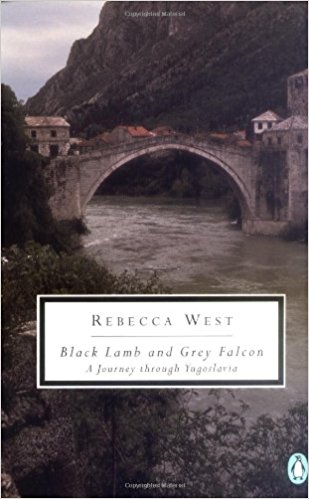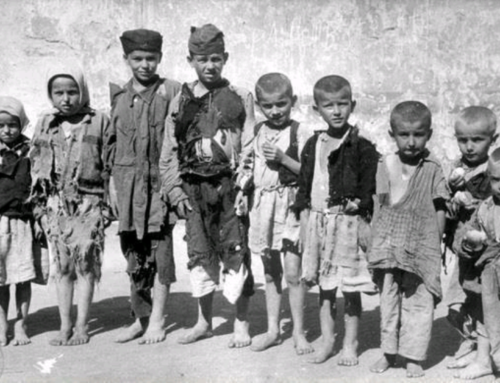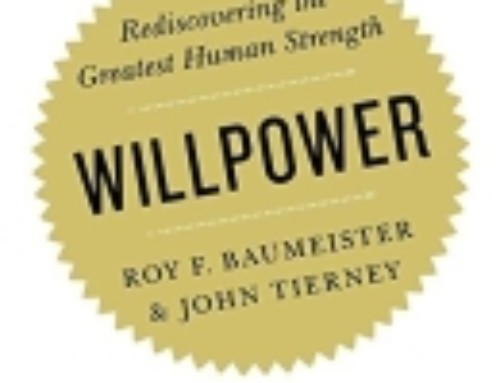I was very intrigued when I read Georgie Ann Geyer’s Buying the Night Flight. This woman traveled alone in a man’s world from Egypt to Russia to Cambodia to Cuba in her rise as a foreign correspondent. In reading her autobiography I got the sense of her interaction with her environment and the delicacy it required. In reading Ryszard Kapuscinski’s Travels With Herodutos, I saw his fascination with the transcendent nature of the things Herodutos wrote about and Kapuscinski saw centuries later. But in Rebecca West’s Black Lamb and Grey Falcon, you see one country come alive. You feel like you are there–really there in the rooms she is in, seeing the clothes she describes, tasting the food, smelling the smoke, and being frustrated to exhaustion by the human capacity to struggle against one-another.
In 1937, Rebecca West dragged her husband to Yugoslavia for a 6 week trip through almost the entire country. Her goal was to “show the past side by side with the present it created.” It took her more than 3 years to write and edit her book which would be published serially in New York and then in two book volumes in 1941. Today, Black Lamb and Grey Falcon stands as one of the greatest works of Western Literature. How so? Lets dive in…
Constantine rocked in his seat…”And I admit that in our Serbia, there are sometimes people who are not chonest (sic). But how could we do? There are not enough people in our country to take on the administration, so many of us were killed in the war. Ninety Percent,” he wailed, “ninety percent of our university students were killed in the war.” And that, too, I learned afterwards, is true. “Then why do you not draw on us Croats for officials,” asked Valetta. “There are many Croats whom nobody in the world would dare to call untrustworthy.” “But how can we let you Croats be officials?” spluttered Constantine. “You are not loyal!” “And how,” asked Valetta, white to the lips, “can we be expected to be loyal if you always treat us like this?” “But I am telling you,” grieved Constantine, “how can we treat you differently till you are loyal?” It is an absolute deadlock, and the statement of it filled the heart with desolation.
In one paragraph we get more than a mere glimpse, a real insight into how two peoples see each other. We see, almost casually, the author checking the facts and confirming a claim. And we see the deep insight the author brings to her subject, incisively telling us that our hearts should be desolate over an area many, even in her time, did not know much about.
There are few works of literature that cross lines of genres to the extent that they are difficult to classify. Fewer still are so respected across the years that they turn up in college syllabi on both sides of the Atlantic Ocean in multiple courses from government, to women’s studies, to sociology, to ethnography. Many authors wrote on a myriad of topics over the course of his literary career, but I find it difficult to find one work that crosses genre lines like Black Lamb and Grey Falcon.
The Los Angeles Review of Books said: “Probably misclassified as a work of travel literature, the book has a curiosity, seriousness, and depth of insight that make it more akin to such classics of ethical reportage as Alexis de Tocqueville’s Democracy in America and T. E. Lawrence’s Seven Pillars of Wisdom than to anything attempted by Bryson or Theroux.” High praise, indeed. At more than 1,100 pages, it is longer than the New Testament and West herself thought nobody would be interested in reading it. Sadly, many do pass it up because of its length. But those that follow the recommendations they trust become West’s apostles.
Historians appreciate West’s work for her insight into the meaning of historical events such as Empress Elizabeth’s conception of the Dual Monarchy and her convincing her Emperor husband to create a second capital in Hungary and thus prolong the Hapsburg Empire into the 20th century. Sociologists appreciate her insights not only of the people she was observing and writing about, but also of her Serbian (former German Jew) government guide and his disagreeable German wife, Gerda, who longs for a pure country.
In her third chapter on Skoplje, Macedonia, she writes of Serbs, Macedonians, Gypsies, and Albanian Muslims all living together in what was undeniably then and could be at some future time in other countries (perhaps London, Toronto or Los Angeles???) a model of diversity and multiculturalism. Yet there is Gerda with an opposing view. A lesser author would not have included Gerda’s positions if the author was interested in only her own observations.
When discussing her appreciation for the diversity of cultures in Macedonia, Gerda and West spar in what we can appreciate today might be seen on a political talk-over-each-other show:
Gerda said, “You like it?” I murmured, “Of course, of course.” Beautiful boys and girls were dancing in the open air, wearing clothes lovely as flowers, against a background of snow peaks, trees palely incandescent with spring, and shining waters. Who on earth would not like it? Gerda said, “I do not like it. See, I have lit a cigarette. I must smoke here to disinfect myself. When I see these people I feel I am not in Europe.” She went on, “Why do you like these people? How can you possibly like them? Do you not see they are dirty and stupid?” I said, “They have what we have not got.” But Gerda hurried along beside me, saying, “I do not understand you, you go on saying what a beautiful country this is, and you must know perfectly well that there is no order here, no culture, but only a mish-mash of different peoples who are all quite primitive and low. Why do you do that?” I said wearily, “But it is precisely because there are so many peoples that Yugoslavia is so interesting. So many of these peoples have remarkable qualities, and it is fascinating to see to see whether they can be organized into an orderly state.”…We stepped on to the high road in broken order, just in front of an old man who was on his way to Skoplje. He was plainly very poor. Indeed I do not think that in all my life I had ever seen anybody poorer. His coat and breeches were so much patched that it was hard to say whether either had had originally been black or brown: and his broken sandals were bound with rags but, even so, showed his bare feet. He had been greatly injured by his poverty. He leaned heavily on his staff, and he mumbled sadly through his beard through the ground. Gerda walked up to him and stood in front of him so that he had to stop, and then turned to us. “Look!” she cried, pointing to his tattered clothes and laughing, “if a great producer like Rheinhardt had tried to invent a figure of misery he could not have thought of anything so dreadful.”
What many readers will fail to recognize is the difficulty of journaling these discussions with precise recall every night on a trip long before the advent of personal recording devices. She not only put together detailed conversations from memory every day, but wove them into a narrative that is so easy to read, so compelling, and so insightful that the reader cannot help but walk away both smarter and impressed with this woman who is known to us today only through her words and the words of her biographers.
West clearly depicts prejudice in Gerda. She depicts prejudice in the ethnicities of the former Yugoslavia. She even shows her own prejudice against Germans in her long quotations of Gerda. The poor old man was a ghost to his own people. He was offensive to a proud German woman. He was an object of pity to the English travelers. Did nobody see him with any inherent dignity?
Finally, West has much to teach aspiring writers, be they novelists or historians. In her description of a Bosnian woman, West gives examples to generations of writers material to emulate:
…but from his wife’s lips that music came in such animal purity that we called her the Bulbul, which is the Persian word for nightingale…A human being could not speak so unless she loved many other sounds–the wind’s progress among trees or the subtler passages it makes through grasses–all sorts of sounds that many Westerners do not even hear, so corrupted are they by the power of their intellect…Listening to her, one might believe humanity to be in its first unspoiled morning hour…Yet there was nothing lax about this woman. Though she lived for pleasure and the dissemination of it, she shone with chastity as absolute as that radiated by any woman who detested pleasure. She had accepted a mystery. She had realized that to make a field where generosity can fulfill its nature absolutely, without reserve, one must exclude all but one other person, committed to loyalty. That field was marriage. Therefore when when she poke to any man other than her husband she was all to him, mother, sister, friend, nurse, and benefactress, but not a possible mate.
West wrote novels, travel diaries and literary criticism. Biographies tell her life’s details, from her 10 year relationship with H.G. Wells, and articles (such as this one) condense her personal story into a digestible reading in one sitting. And it is important to appreciate the background, experiences and perspectives of the author of such a great literary career. Her ability to present dialogue is more than mere stenography because it shows how important, how vital perspective is in any situation in which two or more parties come together in conflict. She closed one chapter with a historical, cultural dialogue between her and her government guide, Constantine (not his real name). They recognized that World War I would have happened even if Gavrilo Princip had not assassinated Archduke Franz Ferdinand in 1914.
Throughout the book, you get strong sentiments of the coming Second World War and the foundations for the Balkan wars of the 1990s and ethnic troubles elsewhere in the world. Nowhere does West say the world is doomed to fight perpetually. But she does give the thick description that political and social scientists see as necessary to understanding any conflict, of any peoples. “For some in Bosnia the East gave, for some it took away.” That kind of insight makes pithy throw-away lines, telling us that these people have always fought and always will, facile and unhelpful.
So did West succeed in her desire to show history alongside its necessary outcome? I think so. Certainly, Yugoslavia does not exist any more. But the past differences and thought processes remain strong to this day. The Croats largely still develop their identity by not being Serbian, to the point of constructing an almost entirely new language in the past 20 years, and they still look for respect from their Germanic neighbors that those neighbors are not so willing to give. Serbs are still trying to decide if they are Western or Eastern European. They still produce the ideas West ascribed to them, but largely in other countries when they leave Serbia for better opportunities abroad. Today, many Serbs say that they have not the ability to build their own bridges since all their best engineers and planners leave as soon as they can. And their multicultural cities were never the norm. But West never said they were. She only spoke of the possibility and asked whether they could work. They certainly do elsewhere in the world, so why not in the cities of the former Yugoslavia?
I place Black Lamb and Grey Falcon among the greatest works of Western literature ever. Whoa, what? Among the greatest works of Western literature? Yes, I think it is. Although I’m not alone in this premise, I offer you a challenge to read the book. It is not for everyone. My dear friend, Tom Infelise, back in 1996, almost went into apoplectic shock when I told him I was reading one of the best books I had ever read. When he heard the title, he relived an entire year of sociology at the University of Wisconsin in which he was assigned this book. Yes, in one respect, Tom was right; it is a long book. But there is so much to learn about the history of an important region in the world and sociology of how those peoples’ relationships, psyches, and daily lives work. I cannot see how a person can fail to learn something to apply in their own lives after reading this excellent work.
Pick up the book. Pick up a pencil for when you feel compelled to make margin notes. Get a new package of post-it page tabs and when you use them all up halfway through the book, get another. And make some room on your prominent shelf to put the book for when you start referencing it for years to come.
Keep thinking…







Leave A Comment